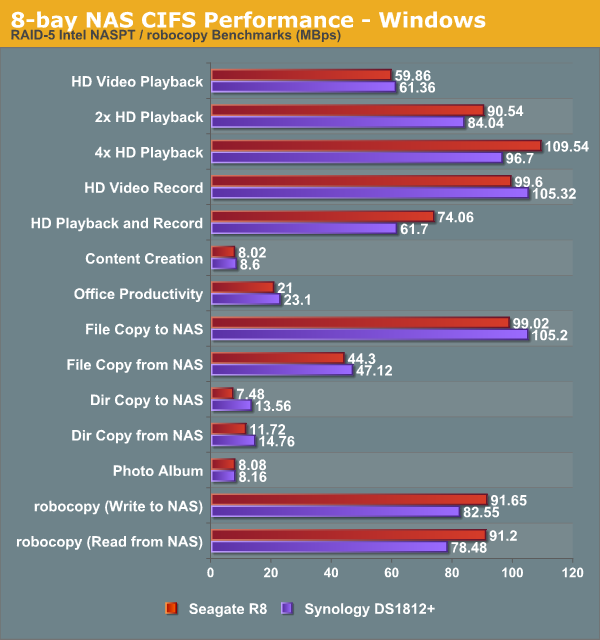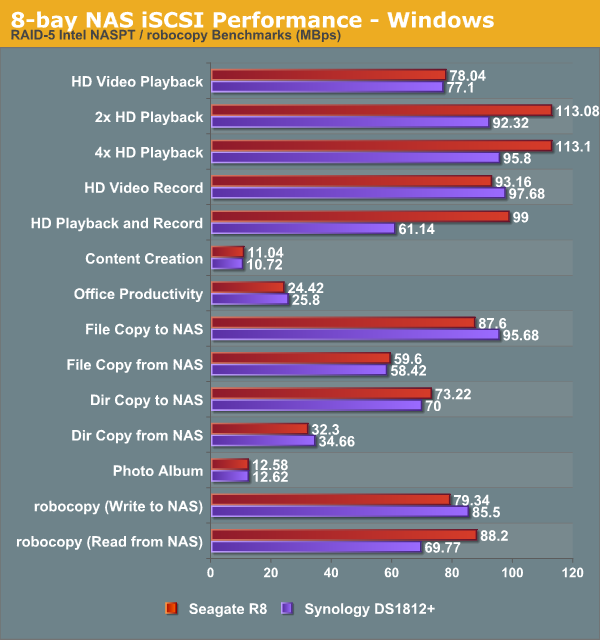Seagate Business Storage 8-Bay 32TB Rackmount NAS Review
by Ganesh T S on March 14, 2014 6:00 AM EST- Posted in
- NAS
- IT Computing
- Seagate
- Enterprise
Single Client Performance - CIFS and iSCSI on Windows
The single client CIFS performance of the Seagate Business Storage 8-Bay Rackmount was evaluated on the Windows platforms using Intel NASPT and our standard robocopy benchmark. This was run from one of the virtual machines in our NAS testbed. All data for the robocopy benchmark on the client side was put in a RAM disk (created using OSFMount) to ensure that the client's storage system shortcomings wouldn't affect the benchmark results. It must be noted that all the shares / iSCSI LUNs are created in a RAID-5 volume.

We created a 250 GB iSCSI target and mapped it on the Windows VM. The same benchmarks were run and the results are presented below.

It is interesting to note that the Atom D27xx-based Synology DS1812+ runs neck-to-neck with the Seagate R8, but the extra CPU grunt of the Celeron G1610T helps the Seagate unit march ahead in a number of benchmarks.
Encryption Support
The Seagate NAS unit, unfortunately, doesn't have native encryption support. Even though the Celeron G1610T doesn't support AES-NI, software-based enryption would have definitely yielded better results compared to what is obtained from Atom-based units. In any case, Seagate believes that using SEDs (Self-Encrypting Drives) for the disks would be a better option for customers with no impact at all to the NAS performance. Even though none of the SEDs are currently in the public compatibility list, Seagate says they do support them.
Under usual circumstances, we would not have liked the limiting of consumer options (since SEDs definitely cost a bit more compared to the non-encrypted versions). However, given that the HDD vendor and the NAS vendor are both the same for this product, it wouldn't be too much of a drawback. In essence, if the user / company is looking for a diskless enclosure, there are multiple options available with a better feature set. We believe the allure of these units stem from the fact that the disk and NAS vendor are one and the same, allowing for better support and lesser overhead for the IT department.










28 Comments
View All Comments
buffhr - Friday, March 14, 2014 - link
I can see the merit in a single point of contact, however at 5.1kusd it is overpriced IMO. Sure the disk = roughly50% of the cost but still 2.5k disk-less for a system that does not support SSH and practically has no ecosystem or encryption...Samus - Friday, March 14, 2014 - link
I can't believe what a hit encryption has on read performance. 25MB/s opposed to 102MB/sec? Holy...extide - Friday, March 14, 2014 - link
It would be a lot better if they used a CPU with AES-NImax1001 - Friday, March 14, 2014 - link
Look at the CPU. There's your answer.Ammohunt - Thursday, March 20, 2014 - link
I agree $5k buys alot of jbod that you can hang off an exiting server and configure however you want ZFS, tgtd, SMB, CIFS, NFS etc..Haravikk - Friday, March 21, 2014 - link
For such a large investment I'm pretty surprised by the lack of attention to detail here. There is no hardware support for encryption, which is crazy; my ~$250 Synology DS212j has an ARM processor with hardware encryption, so why doesn't a $5000+ machine? Also, 2x gigabit ethernet seems pretty meagre these days when any serious data users will be (or should be) investing in 10 gigabit ethernet at the very least, and while the controllers are pricey it would fit well within the huge premium here.I mean, I'm nearly finished building a DIY storage box; it's not racked (since I'm building it around a tower case), but it has 15 hot-swappable 3.5" hard drive bays. I'm using it for direct attached storage and it's coming in around $800 or so, but I don't think a small form factor motherboard sufficient to run ReadyNAS would push me much higher after swapping out the DAS parts. I dunno, for $5000+ I would think an enterprise oriented product should be able to do a lot better than what I can build myself! Even if I switched everything for enterprise parts I'd still come in under.
tech6 - Friday, March 14, 2014 - link
It seems to have become the norm that companies release products with half finished software and expect their customers to be their beta testers. Why would any business in their right mind pay $5K for an unfinished product when there are much better alternatives available?Sadrak85 - Friday, March 14, 2014 - link
Did a back-of-the-envelope calculation a while back; the 2.5" ones just make more sense if you need maximum storage at the moment. That said, when we have the next gen of HDDs filled with helium and holding 10+ TB apiece, 3.5" all the way.Sadrak85 - Friday, March 14, 2014 - link
I eat my words, the 2.5" ones are 9U for 50 drives...which is fewer TB/U, if you can accept the units. This one can make sense after all.Samus - Friday, March 14, 2014 - link
I've replaced all our Seagate Constelation.2 drives over the past 3 years with Hitachi's, as they have failed like clockwork in our HP ML380 that came equipped with them.When I get the replacement back from HP, I put a Hitachi in the cage, install it in the server, and put the Constelation on eBay where I usually get $50. That's all they're worth, apparently.
I love Seagate, but between their load/unload cycle-happy desktop drives that have a pre-determined death, and their ridiculously poor quality SAS drives, I just hope their SSD's are their saving grace, because my how the mighty have fallen from the 7200.7 days.